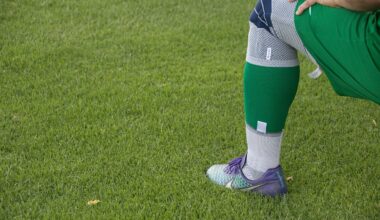Nutrition Plans for Youth Swimmers
Nutrition plays a crucial role in the performance of youth swimmers. To ensure optimal athletic performance, young swimmers need balanced diets tailored to their age and training intensity. Such diets support energy levels, recoveries, and muscle development. Key components include carbohydrates, proteins, and fats. Carbohydrates serve as the primary energy source, so athletes should aim for whole grains, fruits, and vegetables. Proteins are vital for muscle repair and growth; sources like lean meats, dairy, legumes, and nuts should be incorporated. Healthy fats found in avocados, olive oil, and fish provide essential fatty acids for overall health. Hydration can’t be overlooked; water intake is essential, especially before and after swimming sessions. Additionally, athletes may benefit from electrolytes to maintain hydration levels. To plan effective meals, consider a swimmer’s training schedule. Pre-competition meals should focus on easily digestible carbohydrates, while post-training meals must emphasize recovery with protein and carbs combined. Each swimmer has unique dietary needs, so consulting with a sports nutritionist is advisable. This tailored approach helps youth swimmers achieve their potential and enjoy their sport enthusiastically.
As young athletes grow, their nutritional needs will evolve. Regular monitoring of their dietary habits is essential to ensure they are meeting their requirements as they progress in age and training. Parents and coaches can play a vital role in promoting healthy eating by developing meal plans together. Encouraging participation in meal selection helps swimmers become more invested in their nutrition. It’s also beneficial to educate them about portion sizes, meal timing, and the importance of various food groups. A well-balanced meal should include a variety of food items that provide vitamins and minerals necessary for growth and recovery. Participation in cooking healthy meals can also foster better eating habits, bringing families together while teaching valuable skills. Involving swimmers in food preparation can motivate them to make smart choices. Regard for snacks is equally important; options such as fruits, yogurt, and trail mix serve as healthy pre- and post-training options. Ideally, athletes should have snacks ready on hand to ensure timely nourishment after training sessions. Finding nutritious snacks can ultimately lead to improved performance in the water.
Meal Timing and Hydration
Meal timing is another critical aspect of nutrition for youth swimmers. Consuming meals and snacks at appropriate intervals can boost performance and recovery. It’s essential for young swimmers to develop a nutrition schedule that aligns with their training. Ideally, a balanced meal should be consumed about three hours before swimming, helping to maximize energy levels. A light snack should follow approximately 30 to 60 minutes before training to fuel their performance without causing discomfort. Post-practice nutrition is equally important; consuming a mix of carbohydrates and protein within 30 minutes aids in recovery. Hydration, however, remains fundamental; athletes should frequently drink water before, during, and after training sessions. They should also utilize hydration strategies such as incorporating electrolyte drinks for prolonged training sessions. Swimmers often underestimate their hydration needs, leading to performance declines. Signs of dehydration include fatigue, reduced coordination, and cramps, all detrimental to their performance. Coaches and parents must encourage hydration, providing reminders and resources to keep swimmers well-hydrated. Establishing these habits forms essential foundations for lifelong healthy behaviors.
Furthermore, creating individualized nutrition plans for youth swimmers is essential for catering to their unique training regimens and personal preferences. Each swimmer’s calorie requirements will differ based on factors like age, body size, activity level, and metabolic rate. Involving nutrition professionals, such as dietitians, can provide tailored advice necessary for athletes. A well-designed plan should consider allergens, cultural preferences, and meal enjoyment to ensure adherence. Engaging youth swimmers in understanding their plan can enhance accountability and ownership over their nutrition choices. Consider using meal prep to make it easier for swimmers to stick to their plan amidst busy schedules. With effective meal preps, they can ensure they have access to healthy options throughout the week. Furthermore, these plans should be adaptable, evolving with the swimmer’s progress and changing needs. Regular check-ins can help adjust nutritional needs as training intensity varies. This supportive approach encourages swimmers to focus on overall health while still aiming for performance goals. The emphasis should always lie on balance. Encouraging swimmers to enjoy their food ensures a positive relationship with nutrition and sport.
Educational Programs for Athletes
Creating educational programs that inform youth swimmers about nutrition can empower them to make healthier choices. Team workshops covering essential topics like nutrition for exercise, meal planning, and hydration are beneficial. Including fun, interactive components can enhance engagement. For instance, cooking demos or grocery store tours can reinforce learning in practical settings. In schools, integrating nutrition education into physical education classes may foster a broader understanding of overall health. Parents should also be included in these educational efforts, receiving guidelines to help support healthy habits at home. Promoting discussions about food choices in the family can reinforce what swimmers learn. It’s vital to emphasize the long-term benefits of healthy eating. Discussing the impact of nutrition on performance aspirations can inspire commitment. Swimmers should also learn to listen to their bodies’ hunger signals, distinguishing between true hunger versus emotional eating. Building this awareness lays the groundwork for healthy eating habits that persist beyond the sport. Concurrently, providing resources such as websites, apps, or articles can help athletes continually build their knowledge about swimming nutrition.
Another critical element in nurturing youth swimmer’s nutritional understanding is the value of mentorship. Coaches, parents, and peers play vital roles in shaping their eating habits. By modeling healthy behaviors, mentors can significantly impact young swimmers. Encouraging dialogue about nutrition among team members can create an open environment that supports healthy eating habits. Swimmers can share personal strategies and meal ideas, creating a communal resource for nutrition tips. Additionally, athletes should be encouraged to reflect on their nutritional choices and performance. Recognizing the correlation between what they eat and how they feel and perform in training can help drive healthier habits. Group discussions after training can facilitate discussions about what worked or didn’t in fueling their bodies. By fostering this culture of nutrition education and awareness, young athletes build a solid foundation for lifelong healthy habits. Peer influences also matter; positive reinforcement among team members encourages everyone to adopt better eating choices. Overall, implementing these mentorship opportunities results in an environment that values nutrition in conjunction with athletic excellence.
Conclusion: Sustainable Nutrition Practices
To sum up, sustainable nutrition practices for youth swimmers can lay the groundwork for lifelong healthy habits. Focusing on balanced diets tailored to individual needs supports optimal performance and overall well-being. Monitoring hydration, incorporating healthy snacking, and developing customized meal plans are pivotal in achieving these goals. Education, mentorship, and regular evaluations will cultivate awareness of nutrition’s role in athletic success. By involving athletes in their meal planning and preparation, it ensures greater adherence to healthy eating patterns. Coaches should actively encourage discussions about dietary practices to empower swimmers. Remember that the influence extends beyond the pool; all these efforts create a ripple effect on their lives. Looking beyond immediate performance, establishing sound nutritional practices serves as a powerful tool for enhancing performance, well-being, and personal growth. As swimmers transition into adulthood, these habits should equip them with the knowledge to make informed choices for themselves. Ultimately, this journey blends sport with health and happiness, leading youth swimmers to not only excel in athletics but also enjoy fulfilling lives centered around wellness.
Overall, a comprehensive approach to nutrition promotes youth swimmer’s development, performance, and well-being. It requires collaboration between athletes, coaches, and families to inspire positive changes. Supportive environments filled with educational resources create an engaging atmosphere where a communication bridge flourishes. Each component of nutrition, from education to implementation—the way meals are prepared and consumed—fosters growth not just as athletes but also as individuals. Emphasizing the long-term value of healthy habits opens up possibilities for future success on and off the pool deck. As swimming continues to be a significant part of their lives, establishing a solid foundation in nutrition will serve them for years. Parents, caregivers, and coaches should continually reinforce these lessons to help young athletes navigate their choices effectively throughout their swimming careers. This ongoing dialogue about nutrition encourages young swimmers to take ownership of their health and future. Ultimately, instilling a deep understanding of the importance of nutrition within this community can promote a generation of swimmers committed to their sport, health, and personal growth. Creating such a supportive culture promises a brighter future for youth swimmers, inspiring countless individuals beyond competitive swimming.


